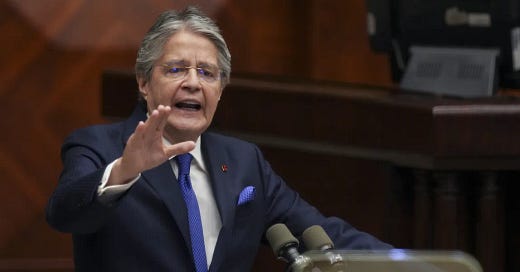Ecuador’s National Assembly voted to begin impeachment hearings against President Guillermo Lasso, who is accused of embezzlement in an oil transportation contract. Lawmakers accuse Lasso of not having intervened to end a contract between the state-owned oil transport company Flota Petrolera Ecuatoriana and the private entity Amazonas Tankers. The accusers argue that Lasso knew the contract was full of irregularities and cost the state millions in losses.
Eighty-eight members of the opposition-controlled National Assembly voted to continue with the proceedings, yesterday. That is just four votes less than the two-thirds majority that will be needed to impeach, reports the Washington Post.
Lasso vehemently defended himself against the allegations, yesterday, saying the opposition is driven by "superhuman resentment" which is "proof of my innocence."
Lasso did not say whether he would move to dissolve the National Assembly. But he has previously said he would respond to a likely impeachment with the so-called “muerte cruzada,” which allows him to call new general elections and rule by decree for six months. (Associated Press)
Analysts fear such a move could spark protests similar to those that broke out last year over the rising cost of living, reports Al Jazeera.
Lasso’s hopes of surviving the impeachment proceedings were further hit on Sunday when the National Assembly re-elected president Virgilio Saquicela, an independent who has become a principal figure in the process against Lasso, reports Reuters. Lasso’s Creo party was left without representation on crucial oversight committees, reports the Financial Times.
ELN paused peace negotiations
Colombian ELN leader Pablo Beltrán said that peace talks between the guerrilla group and the government have been put “on pause” due to remarks made last week by President Gustavo Petro, who questioned whether members of the rebel group’s delegation in Cuba could effectively control the actions of their own commanders on the battlefield, reports the Associated Press.
Speaking last week before Colombia’s armed forces, Petro said that negotiations with the ELN in Cuba do not mean authorities should permit the group’s “illicit economy,” in reference to drug trafficking. The government later responded to the ELN’s demands for rectification with reiterated support for the ongoing talks, reports France 24.
"The negotiations have entered into a crisis and clarity is needed from the government, so that the path towards peace is cleared and so that we might speak in plain language to the country and the world," said the ELN in a statement.
It is the latest setback to negotiations with Colombia’s largest remaining guerrilla group, which Petro restarted last year, reports Reuters.
Regional
Dominican Republic authorities detained and deported to the U.S. a 51-year-old Cuban national accused of using false buyers in Florida to purchase weapons intended for Haiti. The case “is the latest example of how weapons are pouring into Haiti, sometimes directly from Florida ports and other times by way of the Dominican Republic,” reports the Miami Herald.
Colombia
Luis Gabriel Pereira, a young Colombian journalist, was assassinated by two hitmen on a motorcycle who pursued him through the streets of the small town of Ciénaga de Oro. Reporters without Borders called on Colombian authorities to investigate if the murder was related to his journalistic activity — he founded and edited a local news page on Facebook called Notiorense in which he posted short general news items and crime stories focused on the Córdoba region.
Colombian Vice President Francia Márquez is wrapping up a trip to several African countries — South Africa, Kenya and Ethiopia — aimed at strengthening South-South cooperation, with a focus on peace, reconciliation, gender, racial equality and the defense of the environment, reports AFP. The Colombian delegation also signed a number of commercial agreements in South Africa, reports Infobae.
Deforestation in Colombia during 2022 is forecast to have fallen by up to 10% versus the previous year, according to government statistics. (Reuters)
Medical cannabis production is expanding Colombia’s Valle del Cauca, reports EFE.
Guatemala
The closing of elPeriódico this week (see yesterday’s post) “is the latest setback for Guatemala’s increasingly brittle democracy, civil liberties groups say, as President Alejandro Giammattei steers the country toward greater repression, targeting critics, including the news media, opposition politicians and the judiciary.” — New York Times.
El Salvador
The case of two Colombians arbitrarily detained for months in El Salvador is just one example of abuses occurring under the country’s state of exception — other foreigners have been detained, and there are reports of private citizens denouncing business rivals or disgruntled neighbors, according to the Guardian.
Brazil
Brazil’s powerful House speaker, Artur Lira, has promised to block the Lula administration from taking any “backward steps” on economic reform, reports the Financial Times.
Suriname
Several hundred members of Suriname’s Indigenous community carried out a “silent walk” protest, last weekend, demanding government respect of their land rights, following the killing by the police of two Indigenous men two weeks ago. (See yesterday’s Just Caribbean Updates.)
Cuba
Cuban authorities said they will reduce the cost of getting a new passport at Cuban consulates abroad and eliminate a costly fee that their nationals must pay every two years to extend the validity of the passport, among other measures aimed at improving relations with the Cubans abroad, reports the Miami Herald.
Venezuela
Venezuela's nationalization of the scrap metal industry in 2021 was aimed at preventing smuggling, but it effectively created a “state-sponsored free-for-all, with public officials, private companies, military personnel, and criminal groups illegally trading the valuable commodity,” reports InSight Crime.
Chile
Copper outputs have slumped in Chile, a challenge for the Boric administration which needs the funds, and for the world’s green energy transition, which requires the red metal for batteries, reports Bloomberg.





